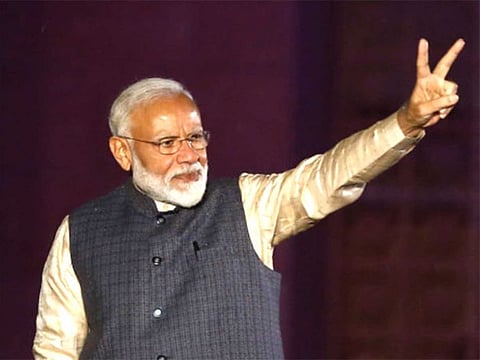Modi must work for a modern inclusive India
New government must steer country in a direction that embraces inclusion and development

the highlights
Modi seems to have released India from notional secular values that the Congress Party has specialised in since independence.
A marked feature of the BJP victory is that it has expanded its catchment areas significantly.
Indian democracy has entered a political phase where there is little or no opposition. That is not a good thing, although decisions will be faster.
There are days when a nation makes history. Thursday, May 23, 2019, was one such for India. The country has voted for Narendra Modi to continue as the prime minister. And it has voted for him almost to a man. The BJP crossed the magic figure of 300 in the 543-seat Parliament. The Congress Party lead by Rahul Gandhi has just about garnered 55 seats, and its alliance—with other regional parties — is stagnating at around 92 seats as this goes to print.
In 2014, Modi had led the BJP to win 282 seats. His current performance empowers him to complete the agenda he had set in the last five years. You could look forward to some drastic decisions.
Modi was ably assisted by his close associate and the party president, Amit Shah, who won his seat from Gandhi Nagar in Gujarat by over 300,000 votes.
The two are set to dominate the show even more than what they have so far done. Among other things, it means their victory will quell whatever little rebellions were happening out of sight in the Hindutva rank and file.
It also means that Modi could, if he is so inclined, form a cabinet on his own, without taking on board partners from splinter, supporting parties. The last point is academic; the massive mandate he has won virtually bestows on him a moral authority that perhaps only the late Rajiv Gandhi had when he won the 1984 general election, following the assassination of his mother, Indira Gandhi, on a sympathy wave.
Gandhi then had toted up 414 seats. The BJP’s remarkable show is primarily thanks to Shah’s organisational genius and talent to communicate the essence of his governance to the masses.
A marked feature of the BJP victory is that it has expanded its catchment areas significantly. In Bihar, for the first time local parties have been shown their place. The BJP has taken home 16 of the state’s 40 seats. In West Bengal, it has broken the spine of Mamata Banerjee’s ruling Trinamool Congress, securing 17 out of 42 seats.
Traditionally, a state given over to the Left, this time the Communist Party of India (Marxist) lost all the seats it contested in West Bengal. In Orissa and the rest of the north and eastern parts of India, the BJP has displaced Congress as the national party. In South India, which is customarily wary of the BJP, the party secured a foothold in Karnataka with 25 seats out of a total of 28. In the Hindi heartland of India, Uttar Pradesh, Madhya Pradesh, and Rajasthan, the BJP beat the hell out of the Congress.
Real India seems to have voted for food. And shelter. And clothes. And maybe a scooter.C.P. Surendran
Modi seems to have released India from notional secular values that the Congress Party has specialised in since independence. It would be interesting to know from impending analyses how the minority communities voted; or, indeed, if the BJP in fact consolidated Hindu votes across caste lines. But no matter what the findings, the fact remains that the poor of the country still see in Modi an ally; someone who will lift them out of the ragged dark pit they live in. This electoral exercise has been a vote in hope and trust, and it is in this developmental sense that one might read into it a kind of fiscal secularism.
Modi will now mean business. He wants a modern India. Hours after the magnitude of his victory became clear, he sent out a message promising progress for an ‘inclusive India.’ India could do with both inclusion and development. Rahul Gandhi also has said much the same thing. Perhaps he looks too good to be trusted as a messiah?
Congress tragedy
Seriously, the Congress must wonder where it went wrong, despite the fact that Gandhi campaigned hard and good. Especially since he has lost his family seat in Amethi (Uttar Pradesh), though his newly adopted constituency in Wayanad (Kerala) has elected him with a resounding margin. To a neutral observer, it does appear that the Congress has to begin working from the ground up if it is to wrest grace in the 2024 elections. And they will have to begin now.
As of now, for the argumentative Indian, democracy has entered into a political phase in which there seems little or no opposition. That is not a good thing, though decisions would be faster. Part of the blame for the potentially autocratic future rests on the elitist media and the scented online crowd which endlessly talks with each other in vacuumed, self-endorsing bubbles. The English speaking class appears to have no real connection with the real India. And real India seems to have voted for food. And shelter. And clothes. And maybe a scooter. Just rudiments of some kind of a life. It’s about time.
—C.P. Surendran is a senior journalist based in India.


